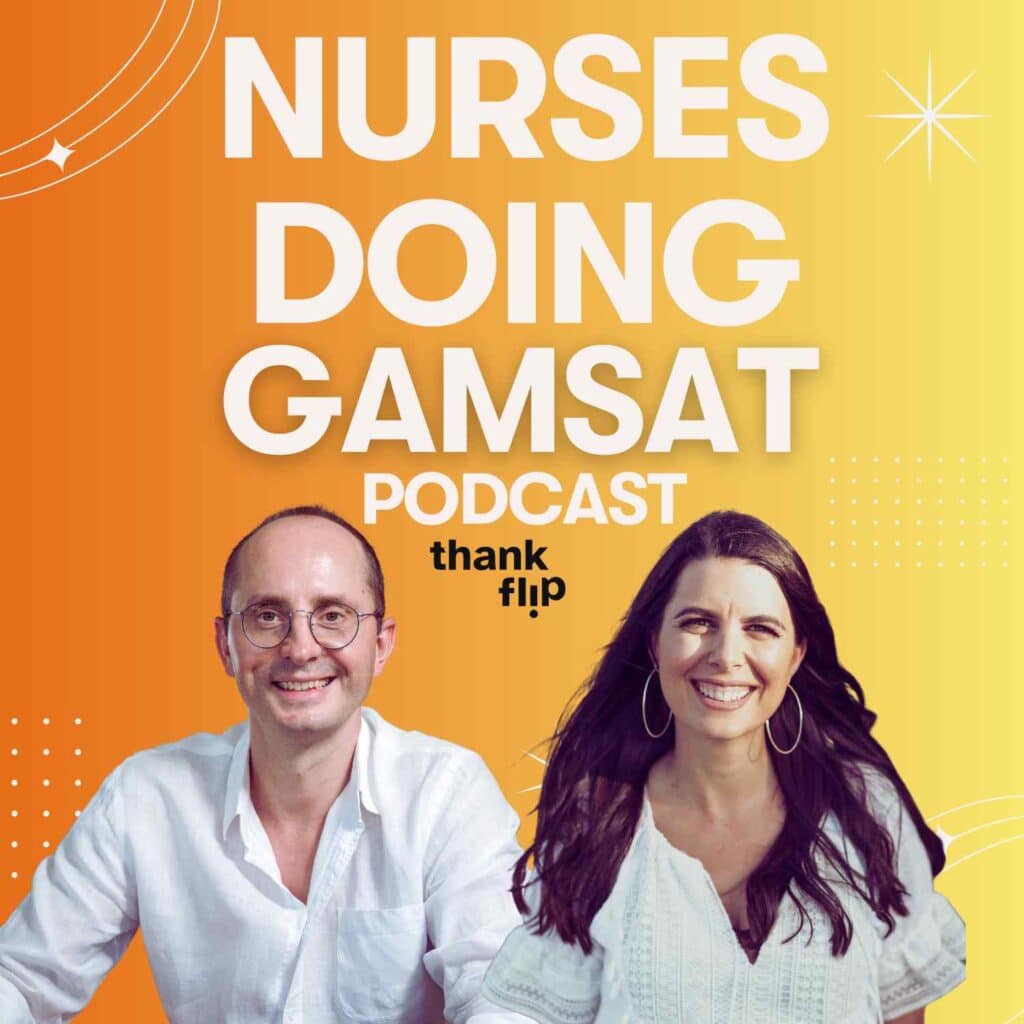In This Episode:
Kicking off medical school is huge—and in this episode, Dr Tom breaks down exactly how to survive your first six months without burning out. From managing the relentless workload to navigating the wild ecosystem of new classmates, expectations and time pressures, you’ll learn the habits and structures that actually keep you ahead. If you’re a new med student (or about to be one), this episode gives you practical, realistic strategies that make the transition smoother and far less overwhelming. Listen in to feel more prepared, more confident and way less stressed heading into your degree.
Resources Mentioned:
- Learn more about our Mission and Values
- To become one of our GAMSAT and/or Interview Tutors, send us an email with a screenshot of your gamsat result, and a short explanation of why you would be a good fit for our team. Send it to contact at thankflip dot com
- Talk to our team about your GAMSAT study approach
Hello and welcome back to the Nurses Doing Gamsat podcast. I’m Dr Tom, Founder and CEO of ThinkFlip Gamsat. Today we’re talking to medical students – the people who have just received their offers and are about to start their medical degree. Congratulations! It’s a huge achievement. It’s a big deal, and I hope you’ve been celebrating. Today we’re talking about how to survive the first six months of your medical degree.
Now, a lot of what I share today will help you throughout your medical degree, but those first six months are the most commonly challenging. They’re where people struggle the most because it truly is a big adjustment period. Hit subscribe, like, whatever you need to do so you don’t miss future episodes. If you are a medical student, this is where I show you all my tips. I share everything, and I’ll also invite you to come work with us at ThinkFlip as one of our amazing tutors. If you’re interested in that, hang around – I’ll talk about it shortly.
So, let’s talk about the first six months, because this is the tricky part. This is where the biggest adjustment happens. Here’s something important to know about medical school: the content you’ll cover is not actually that hard. Sounds strange, right? But it’s not inherently difficult – there’s just a lot of it. There are lots of classes, and a lot of concepts. The content starts really basic – anatomy, physiology, fundamental concepts – which are essentially simple, but there is so much of it. Every week brings another large amount, and it doesn’t stop. It is relentless.
There are two main things you need to adjust to: the workload and the environment.
Workload
If you miss one week, you can catch up. If you fall two weeks behind, it becomes really difficult. Three weeks or more? You’re cooked. You really need to stay on top of it. You can’t say, “I’ll just catch up at the end of semester,” because there’s too much. Time management and being organised are absolutely crucial.
You might say, “What if I get sick? What if something happens?” Medical schools don’t generally care. It sounds harsh because these schools are run by doctors, but here’s an example.
One of the guys I studied with, I think it was at the end of second or maybe third year, had a brain aneurysm. He had neurosurgery, then developed a central nervous system infection during recovery. He was in ICU, in a coma, then slowly recovered, learnt to walk again, and eventually came back. In total, he missed five weeks – and this was just before final exams. He went to the admin team and said, “I’ve just had brain surgery, surely you can help?” They said, “You’ve missed five weeks. You either pass with everyone else or repeat the year. We don’t give leeway.”
It sounds harsh, but if you miss five weeks, that is a big portion of the required knowledge. And they can’t pass you if you’re not competent. Just like ACER with GAMSAT, medical schools don’t care what’s happening in your personal life when it comes to academic requirements. If you fall several weeks behind, it’s on you.
People have come to me over the years saying, “Tom, I’m behind, I’m failing, what do I do?” So here’s what I want to emphasise: You must stay on top of it every week. I’ll share my three rules shortly.
Environment
The second adjustment is the environment. It’s not about whether you’ve studied at uni before. It’s more about the mindset shift. When you were in school or uni, you were probably one of the top students, right? You go into medicine, and suddenly everyone was the top student. Now, everyone is “average” relative to each other, and there’s this weird dynamic where everyone is thinking, “But I’m supposed to be good at this.” You’re adjusting to these personalities, expectations, and the sheer pace.
It takes time to settle in, understand what’s expected, find your people, and work out how to function in this environment. People manage it every year, and you will get through it – but knowing it’s coming helps.
And don’t forget – most of you are not just studying. You’re juggling work, co-curriculars, volunteering, maybe business ventures, friendships, family commitments. Then you suddenly add a massive, relentless, weekly workload. Something has to give. Your studies must be your top priority. Other goals are great – but only after your medical studies are sorted.
I’m very goal-oriented, always have been. But I always structured everything around my medical studies being completed first.
My Three Rules for Survival and Success
Here are the three rules I used to get through my medical degree, while running a business, staying healthy, maintaining a relationship, and enjoying life.
Rule 1: Attend every class live, when it happens.
Watching recordings later is a slippery slope. You think you’ll catch up – but you won’t. It sneaks up on you and quickly piles up. I went to every lecture, tutorial, and lab live. I made notes then and there and ticked it off mentally as done.
Rule 2: Study every Saturday.
Monday to Friday were class days. I didn’t study much after class – I’d go to the gym, work on ThinkFlip, spend time with Marie. But Saturday was non-negotiable. I’d get up, have breakfast, and study all day. Saturday was for catching up on anything from the week and making sure nothing rolled over.
Rule 3: Find a study buddy or group and meet regularly – ideally weekly.
The value here is not just accountability. You get to test each other, teach each other, and push your understanding deeper. Teaching someone else is the best way to confirm you truly understand something.
With these three rules, I got through medical school while living a full life.
Now, for study methods. Note taking is important – but it needs to be active. Auto-transcription, AI summaries – those won’t put knowledge into your brain. You must type, think, and process the information yourself.
I used to turn all my notes into questions. Instead of writing “Cardiovascular System,” I’d write, “Explain the structure of the heart,” or “What is cardiac output and how is it calculated?” That way, when meeting with your study group, you simply ask each other questions instead of reading notes.
Medical study is very different from GAMSAT. It is far more memory-heavy. In fact, as one doctor once told me, “My paediatric training was 100% memorising. No reasoning.” So, get familiar with memory techniques – story association, loci (memory palace), mnemonic devices – because you’ll be using them a lot.
Another great technique used by high performers: learn from multiple sources. Read the textbook, then a reputable website, then an Oxford Handbook, then student notes, then a GP guideline page. Seeing the same concept explained in different ways strengthens your understanding.
Time Management
You must have a calendar – ideally time blocked. And not loosely either – I had mine down to 15-minute blocks.
For example, I knew that uni ended at 3.30. 15-minute bike ride to the gym. 45 minutes in the gym. 15 minutes home. 30 minutes dinner. Break. Then two or three hours of work or study. Then 15 minutes wind-down, shower, sleep.
This may sound overly structured, but high performance requires high structure. Over time, it’ll become natural.
You’ll start thinking in practical terms: “If I go out after uni, how long will it take to travel? Will I be home in time for dinner and study?”
Knowing and owning your time is critical in the first six months.
The curriculum generally goes like this: two years of pre-clinical (studying theory, practising exams on classmates, no real patients), then two years of clinical. In early pre-clinical, they bombard you with everything – you cover most body systems quickly, and it’s overwhelming. The challenge is figuring out what level of depth is expected. They don’t expect you to know everything. You’re getting an overview. Each semester, you slowly learn how to identify the minimum required knowledge (to pass), and the higher-distinction level.
You can still live life outside medicine. Many classmates worked part-time, did locum shifts, ran businesses, travelled, had families. It is possible – but only when you’ve mastered time and energy management.
Medical school doesn’t end your life – but it changes it. You can’t expect to remain who you were. To become a doctor, you must evolve, acquire discipline, structure, resilience. Some friendships will naturally shift, and you’ll also form some of the deepest friendships of your life. I had two classmates in my wedding party – one a groomsman, one a bridesmaid.
Medicine gives you a view into life few will ever experience – birth, suffering, resilience, heartbreak, recovery, joy, death. It’s profound.
Now, if you have fallen behind – here’s what to do.
Cancel everything else that isn’t essential. Work less (or restructure), pause committees, reduce social activities. Do whatever it takes. You must implement:
Attend all classes live
Study consistently (you’ll now need more than one day)
Work with a study buddy or group
Increase study hours. Tighten your schedule. It is possible to recover. I’ve seen many do it – including one woman who had an allergic reaction to the COVID vaccine and couldn’t attend clinicals. She still caught up, adjusted her methods, and graduated.
Later on, once you’ve settled in, you’ll begin thinking about who you want to become – GP, surgeon, paediatrician, researcher, rural doctor, etc. At ThinkFlip, our tutors are medical students just like you – people who’ve been through GAMSAT, succeeded, and want to give back. When you join us, you teach our students, but we also mentor you through your medical journey – helping you build your skills, manage your time, plan your career, thrive as a future doctor. And yes, you get paid.
We are always accepting tutor applications – it doesn’t matter when you hear this. We’re constantly growing. To tutor, you need to have scored at least 70 in the section you’re teaching, and have some teaching or tutoring experience – formal or informal. What matters most is that you align with our mission and values.
Our mission: To help create better doctors. We want to help create 1,000 better doctors by 2029 – and we believe we can do it.
“Better” doesn’t just mean academically excellent – it means skilled, emotionally intelligent, resilient, compassionate, and impactful. We hire, train, and mentor based on these values.
If this resonates with you, the link to apply is in the show notes.
If you have questions about starting medical school, email us. One of our team will always go above and beyond to help. It’s one of our core values.
I hope this has been helpful. Good luck. And hopefully, we’ll be chatting with you as a tutor soon.
Bye for now.
Watch Now on YouTube:
Ready to Make This GAMSAT Your Last? Book a FREE 1-on-1 Call Now!
Before You Go — Get Your Freebie!
Click here download The GAMSAT Manifesto — our free GAMSAT study guide that has (so far) helped more than 60,000 people crush this highly unusual exam. Oh yeah, and did we mention…it’s free?



